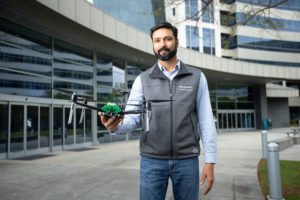


 The new Qualcomm drone platform -5G and AI-Enabled – is making headlines. Here is why the new platform could be important to drone manufacturers and commercial drone customers.
The new Qualcomm drone platform -5G and AI-Enabled – is making headlines. Here is why the new platform could be important to drone manufacturers and commercial drone customers.
Communications are a critical part of drone platforms: they enable the connections between operator and drone. Long-range Wi-Fi connectivity can enable many commercial applications, especially as flight beyond visual line of sight (BVLOS) becomes more viable, and greater autonomy – leading to distance applications without human pilots involved – become more widespread.. Compute power to enable AI, handle multiple sensors, autonomy, and more is also important. The ability to accelerate development of new drone models that make use of the fast moving technology improvements in communication networks, like the 5G rollout, and computing power could be a game changer for drone manufacturers.
Qualcomm is the largest provider of smartphone chips in the world. Qualcomm chips will power the first 5G supercomputer in the world. As Investors.com reports, however, Qualcomm is “first and foremost a ‘steward of patents’ for wireless technology…” which puts the company in a unique position for developing the Qualcomm Flight™ RB5 5G Platform.
The Qualcomm Flight RB5 5G Platform, powered by the Qualcomm® QRB5165 processor, builds upon Qualcomm Technologies’ latest IoT offerings, delivering a solution which will drive the next generation of high-performance, low-power, 5G drones. As a primary driver of global 5G proliferation, Qualcomm Technologies has acted as a catalyst and visionary in enabling 5G to scale and revolutionize the robotics and drone industry. The Qualcomm Flight RB5 5G Platform brings cutting-edge capabilities to the drone industry by condensing multiple complex technologies into one tightly integrated drone system to support evolving applications and new use cases in sectors including film and entertainment, security and emergency response, delivery, defense, inspection, and mapping.

 “We have continued to engage many leading drone companies, enabling 200+ global robotics and drone ecosystem members in addition to consistently driving and promoting worldwide drone standardization and transformative 5G capabilities in organizations such as 3GPP, GSMA, the Global UTM Alliance, the Aerial Connectivity Joint Initiative (ACJA), ASTM,” said Dev Singh, senior director, business development and general manager of autonomous robotics, drones and intelligent machines, Qualcomm Technologies, Inc. “We are proud to continue our momentum of enabling the digital transformation of global industries by unveiling the Qualcomm Flight RB5 5G Platform, a solution that is purpose-built for drone development with enhanced autonomy and intelligence features, bringing premium connected flight capabilities to industrial, enterprise and commercial segments.”
“We have continued to engage many leading drone companies, enabling 200+ global robotics and drone ecosystem members in addition to consistently driving and promoting worldwide drone standardization and transformative 5G capabilities in organizations such as 3GPP, GSMA, the Global UTM Alliance, the Aerial Connectivity Joint Initiative (ACJA), ASTM,” said Dev Singh, senior director, business development and general manager of autonomous robotics, drones and intelligent machines, Qualcomm Technologies, Inc. “We are proud to continue our momentum of enabling the digital transformation of global industries by unveiling the Qualcomm Flight RB5 5G Platform, a solution that is purpose-built for drone development with enhanced autonomy and intelligence features, bringing premium connected flight capabilities to industrial, enterprise and commercial segments.”
“The Qualcomm Flight RB5 Platform’s high-performance and heterogeneous computing at ultra-low power consumption provides power efficient inferencing at the edge for AI and Machine Learning (ML) enabling fully autonomous drones,” says the Qualcomm announcement. “Breakthrough camera capabilities deliver premium image capabilities and performance. With 5G and Wi-Fi 6 connectivity, this platform enhances critical flying abilities beyond visual line-of-sight (BVLOS) to support safer, more reliable flight.”
Qualcomm has partnered with Verizon to test the Qualcomm drone platform on the Verizon 5G network: Qualcomm says that the 5G mmWave capable platform will be offered via the Verizon Thingspace Marketplace.
Companies like Everguard.ai, which specializes in technology-powered industrial worker safety solutions, can easily see the advantages of the Qualcomm drone platform. “Use of drones to capture imagery for construction site topographic mapping, construction progress tracking, security surveillance and equipment tracking in combination with IoT sensors that are deployed on construction sites are revolutionizing how construction projects are delivered! 5G enabled data from drones can be leveraged to unleash the power of artificial intelligence and machine learning algorithms yielding massive improvements in the safety, efficiency and productivity of construction projects”, said Sandeep Pandya, chief executive officer, Everguard.ai.





Related Posts
Windracers ULTRA Achieves 2,000km Range with Heavy-Lift Payload Capability
Walmart and Wing Launch Major Drone Delivery Expansion from Houston
Antigravity A1: World’s First 8K 360 Drone Now Available